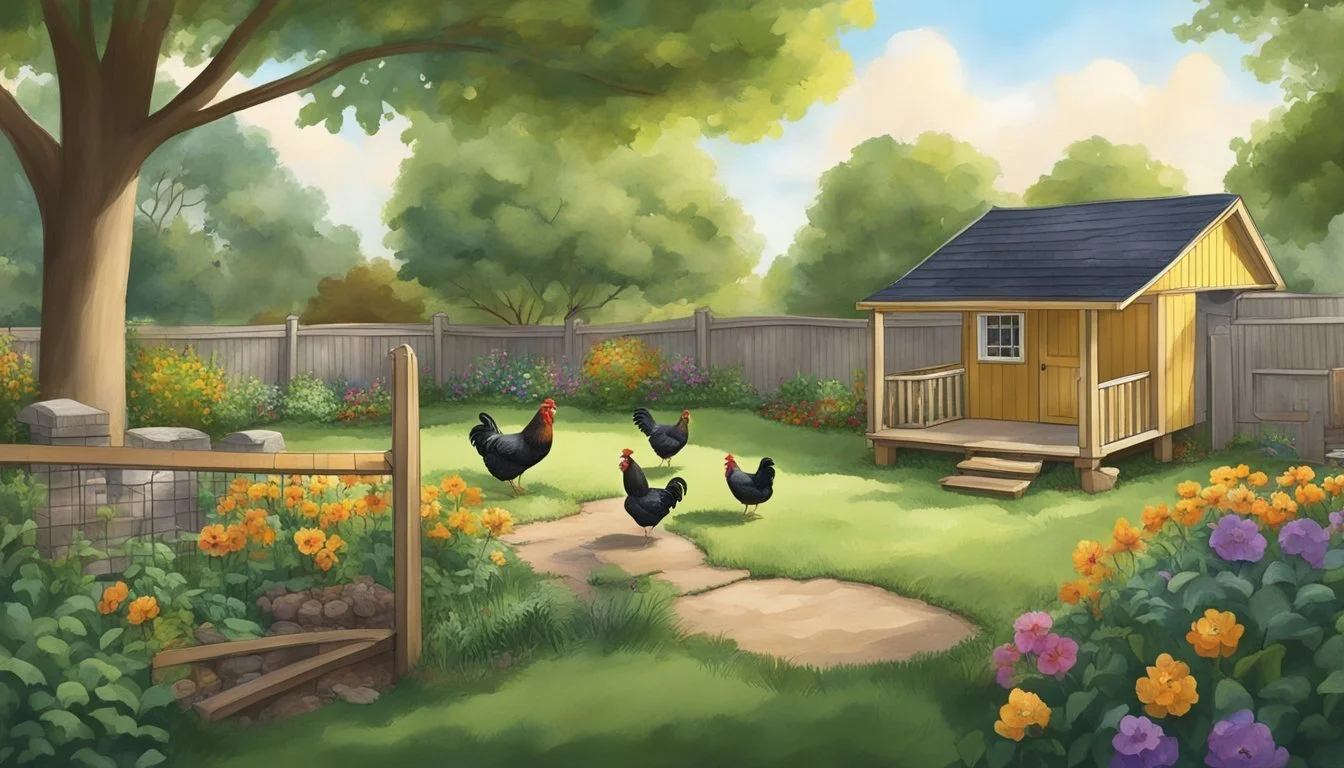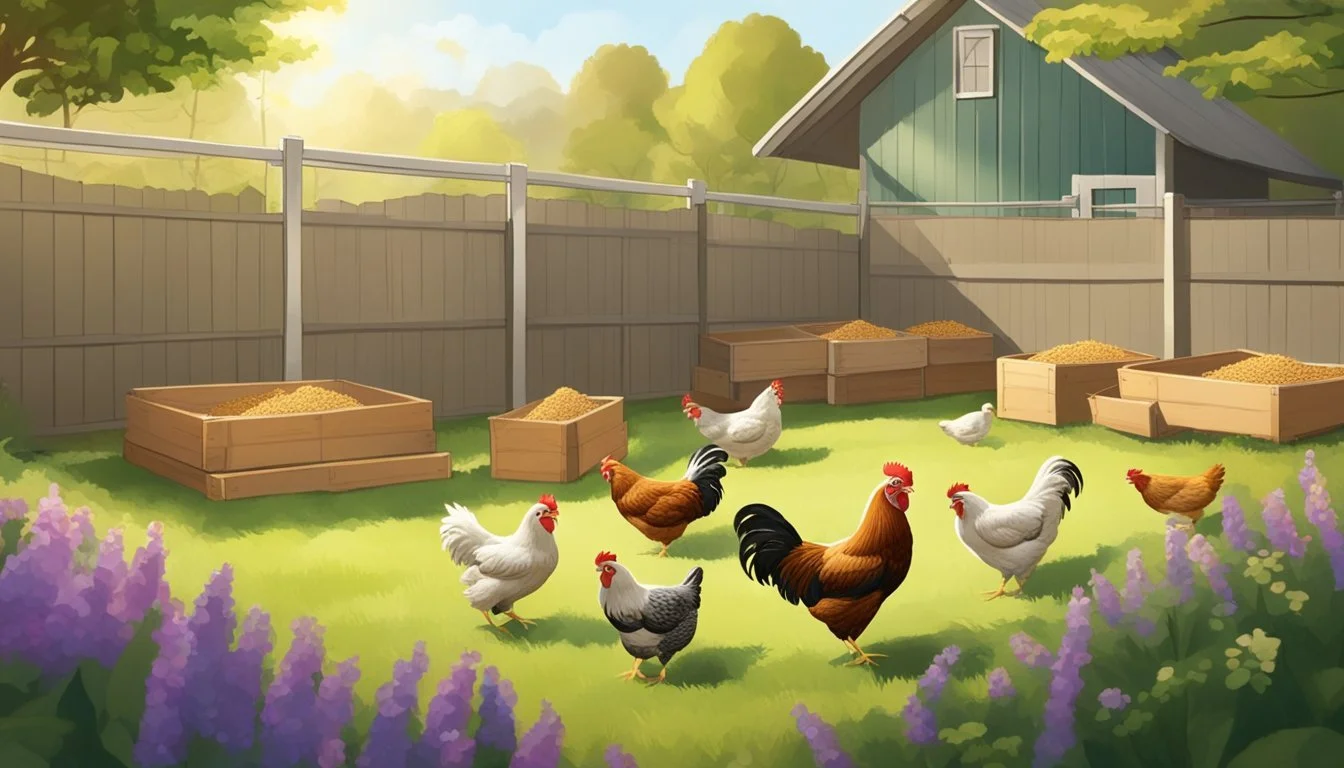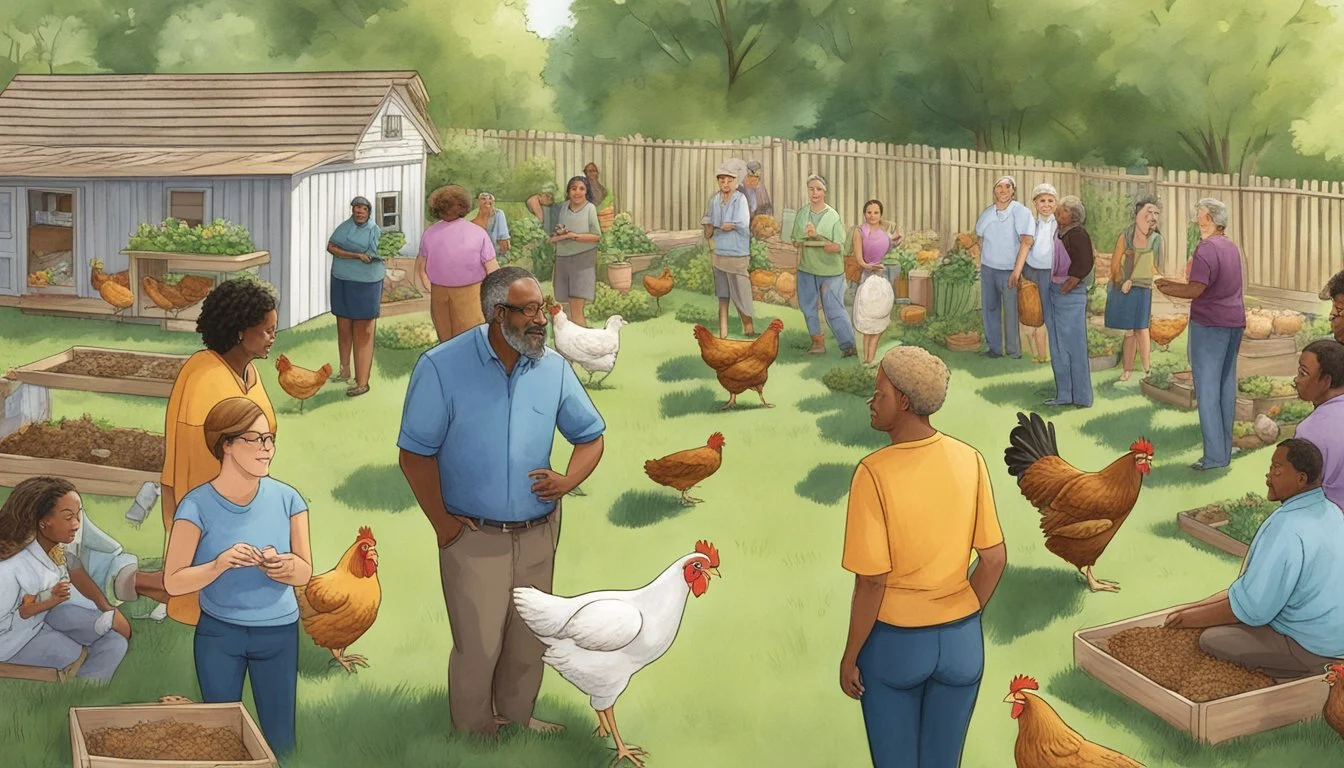Keeping Backyard Chickens in Independence, MO
Essential Tips for Successful Poultry Rearing
In Independence, Missouri, the practice of raising backyard chickens has garnered increasing interest from residents seeking a more sustainable and personal approach to food production. The city has recognized this interest by adjusting local regulations to allow individuals to keep chickens in a residential setting. This legislative adaptation reflects a growing movement towards urban agriculture and provides citizens of Independence with the opportunity to engage in the rearing and care of poultry for eggs, meat, or simply as pets.
Raising chickens in a city environment comes with specific requirements to ensure the welfare of the animals and the community. For instance, Independence mandates that chickens must be housed in a suitable enclosure that is well-maintained and located a considerate distance from neighboring properties. This not only addresses potential concerns about sanitation and noise but also underscores the city's commitment to balancing urban livestock practices with the quality of life for all residents.
Keeping backyard chickens is more than a mere hobby; it's an integration of self-sufficiency into modern urban living. As the citizens of Independence engage in this practice, they join a broader movement of individuals across Missouri and the United States embracing the benefits that come from a closer relationship with their food sources. The experience of nurturing chickens can be rewarding, educational, and a step towards a more sustainable lifestyle.
Understanding Local Ordinances
The City of Independence, Missouri, has specific regulations regarding the keeping of backyard chickens. These ordinances are essential for residents to comply with local laws and maintain community standards.
Independence Chicken Ordinances
In Independence, MO, local ordinances allow residents to keep up to 20 chickens per acre, with the stipulation that roosters are excluded. Chickens must reside within an enclosure, such as a fenced area, coop, or cage, which needs to be situated a minimum of 6 feet away from any property line. These regulations ensure that chickens are kept in a manner that respects the proximity of neighbors and the overall density of the area.
Urban Chicken Laws in Missouri
Urban chicken laws in Missouri can vary significantly from one city to another. Residents must check with their local government to understand the specific regulations that apply to them. For example, in some cities like Columbia and St. Peters, the laws might differ in terms of the number of chickens allowed, enclosure specifications, and distance from neighboring properties.
Comparison With Kansas City and St. Louis Regulations
Comparative analysis of local laws shows that regulations in Kansas City and St. Louis could be more or less restrictive than those in Independence. A resident must review their respective city's ordinances to grasp fully the regulatory landscape. Here's a basic comparison for reference:
City Number of Chickens Allowed Additional Notes Independence Up to 20 per acre Roosters excluded; 6 feet from the property line Kansas City Varies Local regulations should be consulted St. Louis Varies Local regulations should be consulted
It's clear that while all these cities are in Missouri, local government plays a decisive role in shaping the regulations that affect urban chicken keeping within their boundaries.
Setting Up Your Chicken Coop
When establishing a chicken coop in Independence, MO, residents must abide by specific regulations regarding location, structure, and amenities within the coop to ensure the well-being of their chickens.
Selecting the Right Location
The optimal location for a backyard coop should comply with Independence's zoning requirements. Coops must be situated in the backyard and at least 10 feet away from the owner's residence and 20 feet away from neighboring homes. Ideal positioning involves a well-drained area that receives ample sunlight to keep the coop dry and promote the health of the chickens.
Ensuring Coop Safety and Security
A chicken coop must be predator-proof to prevent attacks from common predators such as raccoons, foxes, or hawks. The coop should have a sturdy frame with hardware cloth instead of chicken wire to effectively keep predators out. Locking mechanisms on doors and windows are imperative for nighttime security. Consistent maintenance checks are crucial to spot and repair any potential breaches in the coop's defenses.
Accessorizing Your Coop with Nesting Boxes and Roosts
Internal coop amenities are essential for the chickens' comfort and productivity. Install one nesting box for every three to four hens, and ensure that they are placed in a quiet, darker part of the coop to promote egg laying:
Nesting Boxes: Size around 12" x 12" x 12", lined with straw for comfort.
Roosts: Place at least 2 feet off the ground to provide safe sleeping space.
These structures provide hens with a comfortable and natural environment, which is key to supporting their health and egg production.
Acquiring Chickens and Roosters
When starting a backyard flock in Independence, MO, prospective chicken keepers should first select appropriate breeds and understand the regulations around roosters.
Choosing the Right Chicken Breeds
The climate, available space, and egg production goals are key factors when selecting chicken breeds. Residents can choose from a variety of breeds that adapt well to the Missouri climate. For small spaces, bantams are suitable, while Orpingtons or Plymouth Rocks are ideal for larger spaces with their calm temperament and consistent egg laying. It's essential to consider the purpose of the chickens, whether for egg production, meat, or as pets, which will guide the choice of either layers, dual-purpose breeds, or ornamental varieties.
Layers often include breeds such as the Leghorn, known for their prolific egg production.
Dual-purpose breeds, like the Rhode Island Red, are valued for both egg laying and meat.
Ornamentals, such as Silkies, are typically chosen for their unique appearance.
Understanding Rooster Regulations
In Independence, MO, the regulations are clear concerning roosters—residents are allowed to raise up to 20 chickens, but must examine local ordinances for specific rooster allowances. Roosters can be more of a challenge because of their crowing, which may contravene noise ordinances, and they are not required for hens to lay eggs. Those considering roosters should verify if they are permitted and any specific requirements for their housing and care.
Hens do not need a rooster to produce eggs, which are unfertilized in the absence of a rooster.
Roosters are typically kept for breeding purposes or flock protection.
Chicks can be sexed at hatch to ensure compliance with local rooster regulations.
Pullets, young female chickens, are preferred for those aiming for egg production without the noise and aggression that can accompany roosters.
Daily Care and Maintenance
Effective daily care and maintenance of backyard chickens ensures a clean and healthy environment for the flock. Proper feeding and watering, along with regular cleaning and sanitation practices, are critical for sustaining an odor-free coop that minimizes the risk of disease.
Feeding and Watering Your Chickens
One must ensure chickens have continuous access to fresh water and a balanced diet, which typically includes layer pellets and grains. Waterers should be refilled with clean water every day. Feed should be portioned to prevent waste and deter pests.
Daily Feeding Schedule:
Morning: provide a measured amount of feed
Evening: refill feeders if necessary and remove any uneaten food
Cleaning and Sanitation Practices
Chickens require a clean environment to thrive, which means routine removal of chicken manure and turning of bedding material is essential. Soiled bedding should be replaced regularly to maintain a sanitary space.
Weekly Cleaning Tasks:
Remove and compost waste
Clean feeders and waterers with a vinegar solution
Check for and eliminate any signs of parasites or illness
Ongoing Coop Maintenance
The coop itself needs ongoing maintenance. All enclosures should allow chickens to rest, exercise, and protect themselves from predators. Periodic inspections should be conducted to repair any damages and ensure the coop remains predator-proof and weather-resistant.
Monthly Coop Checks:
Inspect and repair any damaged wiring or structures
Ensure nesting boxes remain clean and dry
Verify that the space remains odor-free and well-ventilated
Health and Wellbeing of Chickens
Maintaining the health and wellbeing of chickens involves a proactive approach to safety and disease prevention. In Independence, MO, residents can ensure their flock thrives through vigilant monitoring and proper care.
Protecting Chickens from Predators and Pests
Predator-Proofing: To safeguard backyard chickens, residents must establish robust defenses against common predators. This includes:
Ensuring the coop and run have secure fencing, with materials such as hardware cloth that extend underground to prevent digging predators like skunks.
Covering outdoor spaces with wire mesh to protect against aerial threats such as hawks.
Implementing latches on coop doors that raccoons and other clever creatures cannot open.
Pest Control: Effective pest management helps maintain a healthy living environment for chickens. Steps include:
Regularly cleaning the coop to minimize the attraction of pests.
Using diatomaceous earth or other non-toxic substances to deter mites and lice.
Removing standing water and sealing feed in secure containers to avoid attracting rodents or insects.
Monitoring Chicken Health and Preventing Diseases
Routine Health Checks: Observant owners can prevent the spread of diseases by:
Examining each chicken regularly to catch early signs of illness, such as changes in behavior, appetite, or appearance.
Quarantining new or sick birds to prevent potential disease transmission.
Disease Prevention: Strategies to reduce the risk of diseases include:
Administering vaccinations where recommended for prevalent diseases in the area.
Maintaining clean, dry bedding and providing a balanced diet to bolster the immune system of the flock.
Legal Responsibilities and Considerations
In Independence, MO, residents considering keeping backyard chickens must closely follow a set of local regulations. These laws are designed to ensure safety, cleanliness, and harmony within the community.
Obtaining Necessary Permits and Licenses
Residents must acquire the appropriate permits to raise chickens on their residential property. It is crucial to contact Independence officials for the latest requirements, as city ordinances may have recently been updated to permit up to 20 chickens per residence. Acquiring a permit typically involves a fee and adherence to specific conditions outlined by local authorities.
Adhering to Property Line and Fencing Laws
Chickens must be kept within the boundaries of one's property, necessitating clear knowledge of property lines. A properly fenced area is often required to contain the chickens and prevent them from straying. The rules stipulate certain distances from the property line to ensure that chicken coops are placed adequately away from neighboring residences:
Coops must be at least 100 feet from the nearest neighbor's dwelling.
They must be positioned 100 feet from the front property line.
Coops should maintain a 25-foot distance from side and rear property lines.
Navigating Neighbors and Community Relations
Maintaining good relations with neighbors is an important consideration for urban chicken keepers. Open communication about one's intention to raise chickens can preempt tensions. The effective management of chicken-related noise and odors is not only courteous but necessary to comply with local regulations that aim to minimize nuisance to surrounding residences. Regular disposal of droppings in an appropriate manner is key to preventing odors and maintaining cleanliness.
The Benefits of Raising Backyard Chickens
Raising backyard chickens in Independence, MO, is a rewarding endeavor that provides families with fresh produce, contributes to a greener lifestyle, and offers valuable learning experiences.
Enjoying Fresh Eggs
Backyard chicken owners revel in the luxury of collecting fresh eggs. The nutritional value and flavor of eggs produced by chickens that are well-fed and cared for far surpass those found in grocery stores. A single chicken is capable of laying hundreds of eggs each year, offering a steady supply of this kitchen staple.
Contributing to Sustainable Living
Chickens contribute to sustainable living through natural pest control and producing organic fertilizer. In Independence, MO, the movement towards sustainable practices is embraced by many residents, and raising chickens plays a significant role. These birds lessen the need for chemical pesticides and fertilizers, promoting a healthier, more sustainable garden ecosystem.
Educational Opportunities for Families
Families embarking on the journey of raising backyard chickens in Independence find it to be a profound educational opportunity. Children and adults alike learn the importance of responsibility and the intricacies of animal care. Caring for chickens fosters a connection to food sources and teaches the value of self-sufficiency in a modern urban setting.
Community and Support
In Independence, MO, individuals interested in backyard chicken keeping find robust community support and helpful resources that make it easier to start and maintain their poultry-raising endeavors.
Local Chicken Keeping Communities
In Independence and surrounding areas like Columbia, Lee’s Summit, Springfield, Raytown, Belton, and Grandview, local chicken keeping communities foster connections among enthusiasts. These communities often have social media groups and forums where members share insights, coordinate events, and discuss chicken care. They advocate for the interests of chicken keepers, contributing to the changing attitudes towards urban poultry laws.
Independence, MO: Successfully advocated for the rights to raise up to 20 chickens at home.
Columbia: Engages in educational outreach on sustainable chicken keeping practices.
Lee's Summit & Springfield: Offer platforms for chicken keepers to exchange tips and advice.
Raytown & Belton: Newer communities are forming, looking up to established ones for guidance.
Grandview: Potential chicken keepers are pooling resources to navigate local regulations.
Resources and Support for Chicken Keepers
Chicken keepers in Independence have access to various resources and forms of support:
Legal Guidance: Local ordinances that define legal requirements for coop placement and number of allowed chickens are provided by area councils.
Enclosures must be at least 6 feet from property lines and 100 feet from other residences in Independence.
Supplies and Equipment: Numerous local farm supply stores offer necessary equipment such as coops, fences, feed, and more.
Educational Workshops: Workshops and seminars on chicken care are regularly hosted by community groups.
Mentorship Programs: Experienced chicken keepers mentor newcomers in best practices and problem-solving.
Health and Wellness Support: Veterinarians proficient in avian care are available, ensuring flocks are kept healthy.
By leveraging these communities and resources, residents can effectively manage backyard chicken coops, contributing to the hobby's growing popularity in the region.







